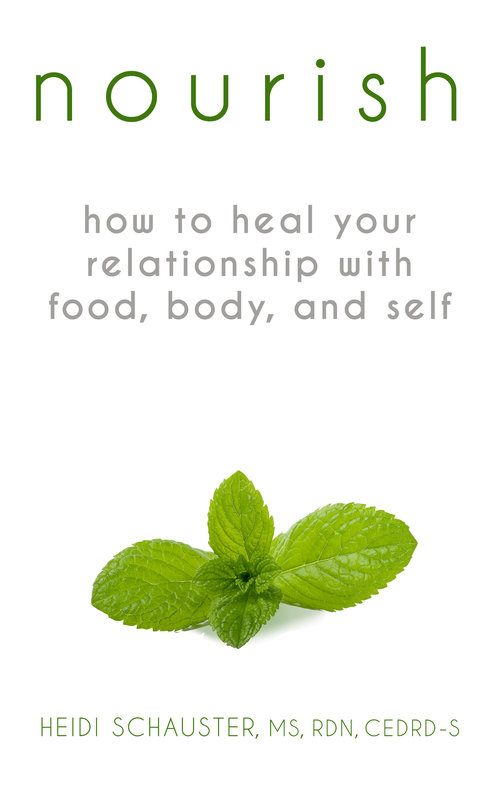How To Raise Kids to Love Food, Their Bodies, and Themselves
By Heidi Schauster, MS, RDN, CEDRD-S Author of How to Heal Your Relationship with Food, Body, and Self 
There are confusing messages about how to eat. Each week brings a new “healthy eating plan” that is “cleaner.” Sounding like breakthroughs, most of them are diets in disguise. In the United States, the diet industry is a $60 billion industry. And research shows that 96% of people who go on diets to lose weight will gain the weight back, nudging them toward the next book, program, or product. The United States also has approximately 6 to 11 million people with eating disorders, the number one killer of all psychiatric illnesses.
In this culture, how do we raise children to have a healthy relationship with food and their bodies?
- Stop the Diet Talk
Ideally, do not diet yourself. If you are, try to keep it out of your child’s consciousness as much as possible. (Once they get older, this is nearly impossible.) Healthful, balanced eating is something that you want for your child, but if you are a chaotic eater who goes back and forth between restricting and overeating, your child will learn how to regulate eating and appetite this way. Most of the clients that I work with who struggle with compulsive eating had dieting parents or they were put on a diet at a young age by a well-meaning parent or medical professional. The greatest risk factor for struggling with weight as an adult is dieting in childhood and adolescence. Please don’t encourage it or demonstrate to your child how to do it.
- Stop the Fat Talk
All genders are affected by a thin ideal and weight stigma. Making someone feel badly about their body size—even casual negative talk about fatness or larger bodies—is damaging to children of all sizes. Those in larger bodies will suffer greatly, and those in smaller bodies will feel they need to work hard to not be a part of that stigmatized group. We all suffer when we don’t accept our differences and instead place a moral judgement on body size. Don’t tolerate negative fat talk from your kids and please examine your own biases.
- Stay in Your Own Lane
Ellyn Satter introduced me to this “rule” about feeding children and division of responsibility. Your responsibility as parents is to provide a variety of nutritious food. Your child’s responsibility is to eat. When we try to “get” them to eat certain things (or not eat certain things), by coercion, reward, or doing somersaults in the kitchen, then we are crossing a boundary. We are not helping our children develop self-regulation skills and body trust. Some basic limits around sweets are fine, for example, as long as everyone in the house abides by them. But cutting out sugar entirely is a recipe for a kid who binge-eats at friends’ houses. I’ve seen it! If you impose food rules on your child, she may use food as a way to separate and individuate from you during the teen years. You will have plenty of other things to negotiate, like curfews. Ideally, keep food out of the struggle.
- Love Your Body, or at Least Accept It
Wehavethebodiesthatwedo for many reasonsthathavenothingtodowithhow weeat or who we are as whole people.Heredity,hormones,andlifelong physicalpatterns haveaprofoundeffectonyourbodysizeand shape.Furthermore, thebeautyindustrymakesusfeelbadabout ourappearancebyairbrushingpores,photo–shoppingthighs, andgivingusapictureofhumanbeingsthatisdownrightfake in order to sell products. Talk about this with your kids.Work on accepting your own unique body. If you chastise your thighs in front of your daughter, you teach her that there might be something wrong with hers. After all, there is a good chance her body will resemble yours one day. If you demonstrate love, care and respect for your body, then it is more likely your children will, too.
- See Your Child as a Whole Person
I love to tellthisstoryofmy daughterinsixthgrade.A groupof boyswerejudgingthe girlsonhow theylook.Sheandhertwinsisterwerein thetopthree,but shedidnotlike it.Tomyamazementanddelight,shemarcheduptooneoftheboysandtoldhim to stopthispractice.She said,“Itmakesthe girlsatthe bottom ofthelistfeelbad,anditmakesmefeelbad,too.”She articulated well thatevenbeingtoldyoulook gorgeouscanfeelobjectifyingandwrong.Iassuredherthatshe issomuchmorethanaprettyface,andsheagreed.Kids understand our looks aren’t who we are, until our selfie culture teaches them otherwise. Create a good foundation for appreciating the whole self.
- Get Help for Problems Early, and Be Discerning About the Help
Please get help for yourself if any of the above tips are challenging. If you notice that your child is developing a complicated relationship with food and body, please express concern and love. Enlist the help of psychotherapists, registered dietitians, and medical providers who have expertise in eating disorders. I have heard many stories of professionals exacerbating the problem, particularly if they have their own unexamined biases against larger bodies or they don’t have training in eating disorders. Research suggests that early help for disordered eating creates better recovery outcomes.
Creating a climate of love, support, and acceptance at home goes a long way toward helping your child develop a healthy relationship with food, body, and self. We can’t prevent many of the cultural and media influences on our children, but we can be a positive nurturing force in the mix and work actively to change the culture.
Heidi Schauster, MS, RDN, CEDRD-S is the author of Nourish: How to Heal Your Relationship with Food, Body, and Self. She is a nutrition therapist, writer, and the founder of Nourishing Words Nutrition Therapy. Heidi facilitates the No Diet Book Clubs, supervises other nutrition therapists who treat disordered eating, and encourages embodied eating and living for all. For more information, please visit, www.anourishingword.com.
Views: 34
